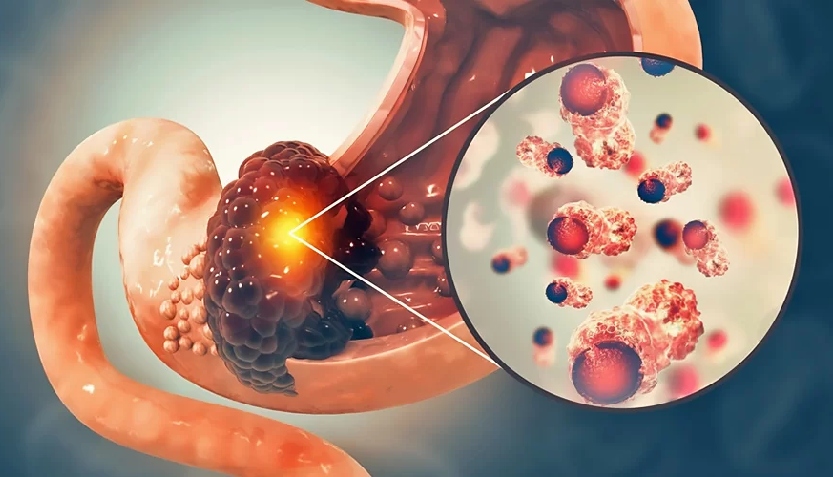
Gastrointestinal (GI) cancer refers to cancers that develop in the digestive system, including the stomach, intestines, liver, pancreas, and other related organs. These cancers can affect digestion and overall health, making early detection and treatment crucial. Let’s explore the most common types of gastrointestinal cancer, their symptoms, and available treatments.
1. Esophageal Cancer
What is it?
Esophageal cancer affects the tube that carries food from the throat to the stomach. It usually develops in the lining of the esophagus and can spread if not detected early.
Symptoms:
- Difficulty swallowing (dysphagia)
- Persistent heartburn or acid reflux
- Unexplained weight loss
- Chest pain or discomfort
Treatment Options:
- Surgery to remove the tumor
- Radiation therapy
- Chemotherapy
- Targeted therapy for advanced cases
2. Stomach (Gastric) Cancer
What is it?
Stomach cancer begins in the lining of the stomach and can spread to other parts of the digestive system. It often develops slowly over several years.
Symptoms:
- Persistent indigestion or bloating
- Loss of appetite
- Nausea and vomiting
- Stomach pain or discomfort
- Blood in the stool or vomiting blood
Treatment Options:
- Surgery to remove part or all of the stomach
- Chemotherapy and radiation
- Immunotherapy for advanced cases
3. Colorectal Cancer (Colon and Rectal Cancer)
What is it?
Colorectal cancer affects the colon (large intestine) or rectum. It is one of the most common GI cancers but can often be prevented through regular screening.
Symptoms:
- Changes in bowel habits (diarrhea or constipation)
- Blood in the stool
- Abdominal cramps or pain
- Unexplained weight loss
Treatment Options:
- Surgery to remove tumors
- Chemotherapy and targeted therapy
- Radiation therapy in some cases
Prevention Tip:
Regular colonoscopies can help detect and remove precancerous polyps before they develop into cancer.
4. Liver Cancer
What is it?
Liver cancer often develops in people with chronic liver diseases like hepatitis B, hepatitis C, or cirrhosis (due to alcohol or fatty liver disease).
Symptoms:
- Jaundice (yellowing of the skin and eyes)
- Unexplained weight loss
- Swelling or pain in the upper right abdomen
- Fatigue and weakness
Treatment Options:
- Surgery to remove the tumor (if detected early)
- Liver transplant in severe cases
- Targeted therapy and immunotherapy
5. Pancreatic Cancer
What is it?
Pancreatic cancer affects the pancreas, an organ responsible for digestion and blood sugar regulation. It is often diagnosed late because symptoms appear gradually.
Symptoms:
- Persistent back or abdominal pain
- Jaundice (yellowing of skin and eyes)
- Loss of appetite and weight loss
- Dark urine and pale stools
Treatment Options:
- Surgery (Whipple procedure) if detected early
- Chemotherapy and targeted therapy
- Radiation therapy for symptom management
6. Gallbladder Cancer
What is it?
Gallbladder cancer starts in the gallbladder, a small organ that helps with digestion. It is rare but aggressive if not treated early.
Symptoms:
- Abdominal pain (especially in the upper right side)
- Nausea and vomiting
- Jaundice
- Swelling in the abdomen
Treatment Options:
- Surgery to remove the gallbladder
- Chemotherapy and radiation for advanced cases
7. Small Intestine Cancer
What is it?
This rare cancer affects the small intestine, which helps digest food and absorb nutrients.
Symptoms:
- Cramping or pain in the belly
- Unexplained weight loss
- Blood in the stool
- Nausea and vomiting
Treatment Options:
- Surgery to remove tumors
- Chemotherapy and targeted therapy
- Radiation therapy for advanced cases
Conclusion
Gastrointestinal cancers can affect different parts of the digestive system, but early detection increases the chances of successful treatment. Regular screenings, a healthy diet, and lifestyle changes can help reduce the risk. If you notice any persistent symptoms, consult Dr. Lalatendu Mahapatra, a Gastrointestinal Surgeon in Bhubaneswar, for a proper diagnosis and treatment plan.
Would you like to learn more or schedule a consultation? Contact us today!

